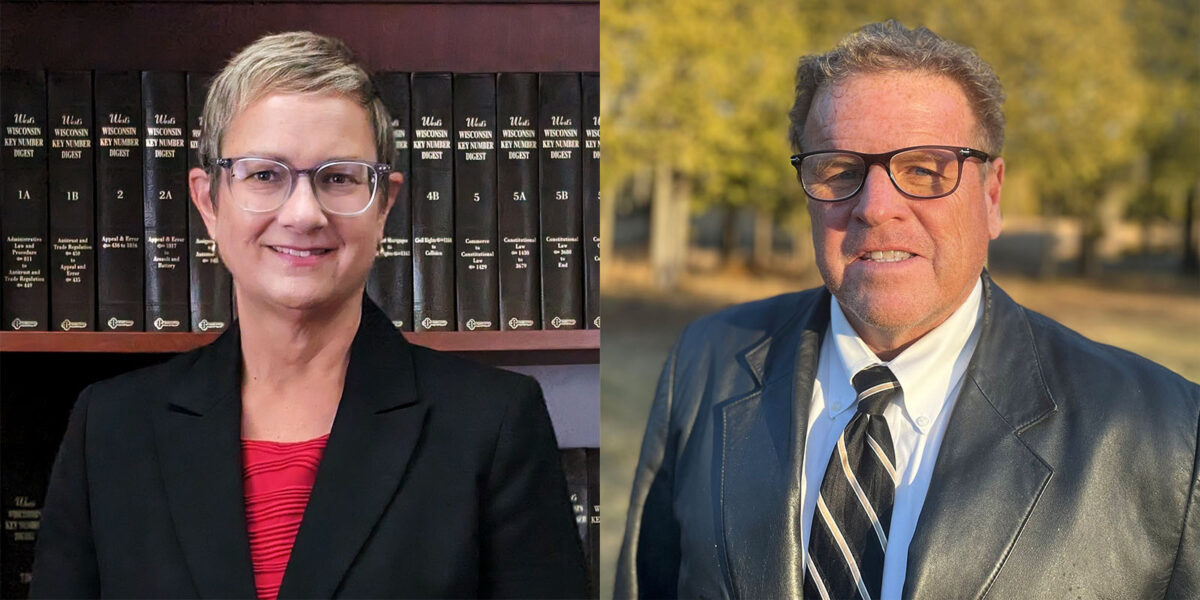For the first time in 24 years, two judicial candidates are vying for one of two spots on the Door County Circuit Court bench. Election Day is April 2.
The Door County court system, in cooperation with the district attorney’s office, Sheriff’s Office and the Department of Health and Human Services, is taking steps toward addressing areas where criminal justice and substance use disorder intersect. An adult drug treatment court program and a handful of diversion programs have been implemented to work with defendants who have substance use disorder issues.
Jennifer Moeller currently serves as the Family Court Commissioner for Door County and has held the position for 13 years. Before that, she was in private practice as an attorney for 17 years.
Brett Reetz has been an attorney for 32 years, most of it as a trial lawyer. He lives in Baileys Harbor where he maintains his law practice.
There are 56 circuit court races in Wisconsin this election cycle, and only 10 of them are contested, Wisconsin Watch reported this week. The Door County judicial election is one of them. The race is historic for other reasons as well; it is the first time in 24 years there has been a contested judicial race in Door County, and Moeller is the first woman to run for the position.
As one of two circuit court judges in the county, the winner of the election will preside over both civil and criminal cases. A majority of these cases do not go to jury trial, which means the judge has the final say on sentencing and outcome, according to the League of Women Voters of Wisconsin. Family law, civil rights, disability rights, labor rights, voting rights and public safety are all possibly affected by circuit court judges’ rulings. (Disclosure: Knock partners with the League of Women Voters of Door County to host issues-based community forums.)
Each candidate was asked the same questions via a combination of separate phone and email interviews. Both were given equal opportunity for length of answers. Their answers are shown based on alphabetical order and have been minimally edited for clarity purposes.
There has been an increase in substance use disorder needs in the county. This impacts law enforcement. Investigator Jonathan Gilson at the Door County Sheriff’s Office said most of the calls they get have mental illness and/or substance use as a component. What is your professional experience with substance use disorder? How does that impact the ways things might happen in your courtroom if elected?
Moeller: Criminal defense was part of my private law practice and so was acting as guardian ad litem (guardian appointed by the court) for minors involved in child protective services cases. Almost always, some sort of substance use disorder was involved in these cases. In family court in Door County, most cases are divorce and paternity, and substance use disorder also plays a part in many of them, as well. Trauma experienced by children, effects on the greater community, it is all woven together. If addiction is not treated, it is a terrible cycle. Get in trouble, go to jail, get released, use again, back in jail. From the bench, a judge can get people suffering from substance use disorder in the criminal justice system into programs if there are options available. Door County gets it. It’s not as simple as stop drinking, stop doing drugs. It affects the whole family, children. I applaud HHS, county government and services for what they are trying to do. Awareness is here. I would continue that progress if elected.
Reetz: More than 80 percent of my criminal defense clients have issues with drugs, alcohol, mental illness, or a combination. Meth stands out particularly; at least half of my criminal cases involve meth use. My experience with people in addiction gives me great insight and I’ve seen people change their lives. It’s never too late. Even with meth. But the brain has the amazing capacity to rewire. I’ve seen it. With my clients, I ask them, what’s your next step? Make a plan. Share success stories. Encourage them to forgive themselves. Find self-love. Make an asset evaluation.
I know how to ask people the right questions to know if they are sincere in their recovery. I don’t look at people as de facto criminals. I’m not a hanging judge when it comes to drugs, though dealing drugs is different. I would build more recovery into sentencing. A judge needs to learn the specifics of an individual’s case and life. Become more intimate with them. Not speaking down to them.This isn’t touchy-feely and soft. This is human love and dignity.
Judge David Weber is currently the presiding judge over the county’s treatment court program. Do you have experience with the treatment court model? What are your views on that and diversion programs within the criminal justice system?
Moeller: I was around when the county began talking about it and saw the planning process. I was able to participate in training hosted by out-of-state treatment court educators. I’m pleased to see we have something like this. It is so appropriate, and I’m pleased with how it’s working and how the community is responding. Seeing the graduates is encouraging. I like how intensive it is. There is community support for this path to sobriety. When things like housing and work are not in place, it makes it harder. I would like to see even more community partners buying in to help find participants employment and housing, as well as the state recognizing the importance of the program and providing more funding. We need to find other ways to handle nonviolent crimes with mental health and substance use disorder components. I have experience in that and am prepared for it. I enjoy a multidisciplinary approach.
Reetz: There is a void in the criminal justice system when it comes to addiction. Recovery programs like Alcoholics Anonymous and the Jackie Nitschke Center are great, but the subtext of these programs is if you quit alcohol and drugs, everything will be OK. To beat addiction, you have to work on the fundamentals, the core person. If you’re happy with yourself, you don’t have the need to escape through substances. I think treatment court and diversion programs are a start. I’d like to see more people with intimate experience of addiction and recovery on the treatment court (steering committee).
If Judge Weber were to be unable to continue being involved with Door County’s treatment court, would you be willing and able to step in and maintain the program as the presiding judge?
Moeller: I am willing and able to preside over treatment court. If Judge Weber is ever unable to continue, the two judges at the time would likely discuss caseloads and logical assignment of treatment court. Door County is investigating a Mental Health Court which might be assigned to one judge, among other considerations.
Reetz: Absolutely. I’ve had enough personal knowledge of addiction to do it; I’d be thrilled to take that position. I get the most satisfaction out of my job when I’m helping, assisting, cooperating with people to make their lives better. I come from a family who drank a lot. Statistically, my sisters and I didn’t have the best chances and we’re all doing well. I love triumph, when people overcome adversity.
Only a small percentage of substance use disorder offenders are eligible for treatment court. At what other points in the criminal justice system, between arrest and sentencing, are there points in which resources for treatment could be implemented?
Moeller: Prior to sentencing, the court can impose requirements on the accused as part of bond conditions. Given that people are innocent until proven guilty, treatment prior to sentencing through the criminal justice system is more likely to occur on a voluntary basis for someone in jail while their case is pending or through Door County Health and Human Services.
If the case is resolved without a finding of guilt, and thus no sentence, treatment could continue through the county and not depend on the criminal justice system. All of this is dependent on available resources.
Reetz: If you can’t make bond, you have the opportunity to participate in Narcotics Anonymous and AA in jail, sometimes. Counseling is available. The system could be more aggressive in evaluating more participants in treatment court. As a judge, if the defense attorney knows they’re before a judge that takes recovery seriously, that knowledge can influence conduct and response coming from the defendant. A bond condition might say absolute sobriety, but the defense attorney knows the judge is pro-treatment? They’ll put their client in Narcotics Anonymous, etc. The court becomes another person they’ll let down if they relapse. That pressure can help people get treatment. A judge can be more comprehensive about someone’s sobriety when they’re on bond, can offer advice and inquiry.
Leading researchers and doctors in addiction science say substance use disorder is a brain disease, a condition that needs medical treatment, akin to high blood pressure and asthma. What is your take on these determinations?
Moeller: The legal community and judiciary have embraced evidence-based practice. Thus, review of credible information and the best available evidence should be ongoing. Treatment of substance use disorder is important to recovery and a sober life.
Reetz: I don’t dispute it. In my experience, I’ve seen people who have no control of their drinking or drug use; it’s genetic. Unlike other diseases, a component of recovery is personal responsibility. Therapy like Al-Anon, AA and so on supplement recovery. From a judicial perspective, someone’s substance use disorder is important knowledge but—I’m not saying it’s irrelevant—but unless they’re willing to take personal responsibility, the reality of a biological disposition doesn’t solve the problem.
What is your perspective on medical management of substance use disorder (like methadone, etc.)? It is rarely used in criminal justice settings, despite overwhelming evidence of its effectiveness in reducing recidivism and relapse.
Moeller: Medical management can be part of addiction treatment. There are barriers to its use in criminal justice settings, including cost and qualified personnel to administer. Review of any system for effectiveness should be ongoing for possible improvement.
Reetz: If it’s adequate medical treatment, not just them becoming a methadone addict, then whatever it takes within some parameters. It’s different for different people. If there’s adequate info that medicine is needed to help transition off heroin or other opioids, (I’m) totally in favor. It would have to come from the defense attorney. Then as the judge I would ask questions: Who’s the doctor? How often do you see them? OK, I’d be easily persuaded. You can’t paint recovery with a broad brush. I’ve seen people fix themselves in different ways.

